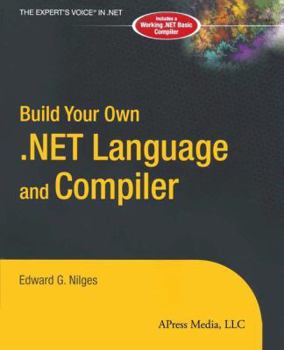Build Your Own .NET Language and Compiler
Virtually every experienced programmer today started out with some version of Basic or QuickBasic and has at some point in their career wondered how it worked. This book will teach language construction and design to .NET programmers, using a fully functioning "QuickBasic" compatible compiler as the example.
Customer Reviews
Rated 4 starsVery good for what it does
First, some clear demarcation about what this book isn't: if you want a book with a really strong theoretical background in compiler design, this isn't it. I have Programming Language Pragmatics by Scott, and I recommend it. Second, if you want a book about compiling to IL for direct execution, this isn't that book either. Frankly, this book is poorly titled in that respect. I don't yet have Compiling for the .NET Common...
0Report
Rated 5 starsone of the best computer book i ever read
It is very entertaining and well written. Does a great job of explaining a difficult topic. The sample code works great.
0Report
Rated 5 starsJust what I needed
Looking at all the reviews, I felt that I definitely had to add my own two-cents. When I read the first couple chapters of this book, I was a bit underwhelmed. I read through the compiler flyover and thought, "well, that is cool, building a calculator." I then went to the next step and actually took the code that he included and began to write my own C# port of the integer calculator. At this point, I really started to get...
0Report
Rated 5 starsThe value of most critics can not be calculated
As I read this book I had to wonder what planet the people that trashed it were from. I couldn't speak better of it and I think the author did a FANTASTIC job of making it entertaining and informative. It's very direct and to the point and I didn't get left hanging on one area. The code works the way he says it does and it's plenty to work with. Oh gee, it's not an 1200 page textbook covering every dark nuance of compiler...
0Report
Rated 5 starsOne of a kind
The previous review is so off base I just had to comment.This book addresses one of the most complex topics in computer science: designing and building a language. Most college books on the subject are nearly incomprehensible. This one can be understood, with some work, by most developers.This was definitely NOT a rush job. Yes, some of the copyrights go back to 1998, but this reflects one of the things that makes this book...
0Report






















